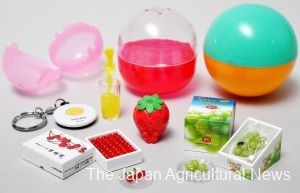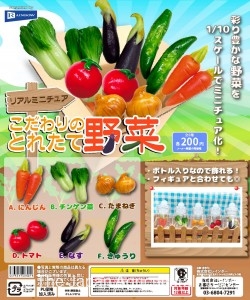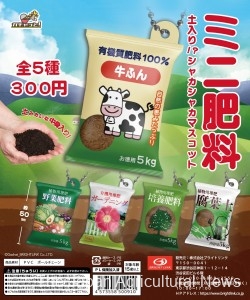TOKYO, Apr. 16 – Capsule toys featuring agricultural products have been appearing on the Gacha Gacha toy market in succession. A Japan Agricultural News reporter confirmed at least thirty series, including seed and fertilizer bags with soil-like contents. Who’s buying such a niche product?
There are many Gacha Gacha specialty stores in Akihabara, Tokyo, where Japan Agricultural News headquarters are located. When we checked one, it had about 100 capsule vending machines with ten selling agri-themed Gacha toys at prices varying from 300 yen to 500 yen each. On the internet, we also found at least 20 other sets of capsule toys featuring agriculture. They are realistic miniature figures of eggplants, onions, expensive fruits in boxes, and soybean-pod-shaped pen cases.
“There is a high demand from grown-up women.” Yusuke Tsuzuki, representative director of the Japan Capsule Toy Association, said to answer our question. According to him, the industry’s target has shifted from children to mothers and single women in their 30s and 40s who have extra money. They do like agri-themed capsule toys, he explained.
Why? Gacha Gacha is now in the middle of the fifth boom. Many specialty stores found their way into large commercial complexes as there were many vacant spaces due to the Covid-19 crisis. Such stores have caught the attention of grown-ups, including women in their 30s and 40s, and that expanded the market size to 72 billion yen. The number of Gacha toy manufacturers multiplied, and they release approximately 450 new series of toys every month.
The fierce competition has given birth to a new trend of liking realistic miniatures of something familiar. The manufacturers began to make something new and different and show videos to compare miniature figures with authentic products, which went viral on SNS.
According to Tsuzuki, agricultural products fit perfectly with the new trend as they are familiar to everyone. “Vegetables have distinctive colors and shapes. We can also have fun recreating details like product specifications printed on their carton boxes,” he said. Some people buy them as matching items for the figures of their favorite anime characters, he added.
Local agricultural cooperative associations (JAs) have also joined the move by helping manufacturers make super-authentic toys. A Tokyo-based maker released a series of toys featuring five high-brand fruits in March this year. The one highlighting shiny red Sato Nishiki cherries from JA Yamagata has beautiful round cherries orderly packed in a realistic carton box with the name of the JA. “We want to raise the awareness (of Sato Nishiki) among a wide variety of people,” a JA official said.
There are some examples of using unique agricultural Gacha to revitalize local economies. In Ehime Prefecture, there is a Gacha machine to sell mandarin orange tickets. In Shimane, a Gacha is selling a sticker of farmers’ characters; if you bring the sticker to the farm, you can win prizes. This fun feature is attracting the attention of residents and tourists.




